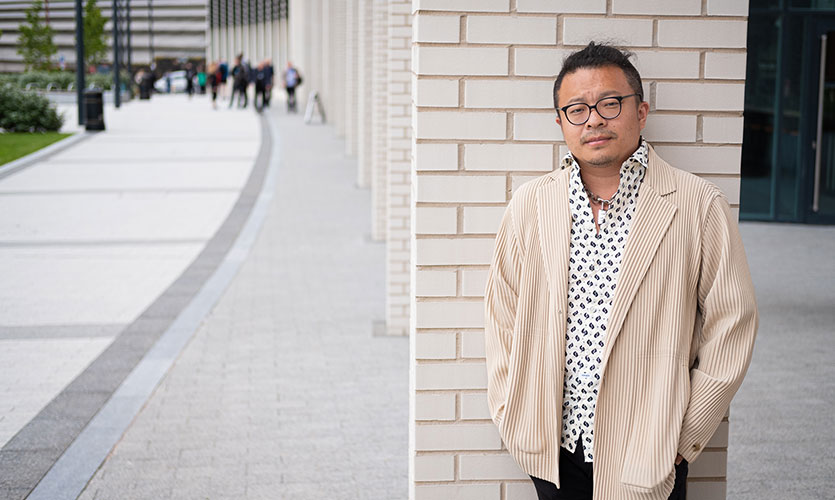Dr Calvin Liu

Dr Calvin Liu is featured in our ‘Humans of LJMU’ series in collaboration with the ‘Humans of Liverpool’ social media account, sharing the stories of the people who make our city, communities and university the vibrant, inclusive place it is in celebration of our bicentenary year.
In his interview he reflects on his personal academic achievements since joining LJMU in 2017, as well as his experiences in Liverpool and the challenges facing the students and academics in today’s uncertain economic and political climate.
“I’m probably one of the only Chinese nationals teaching in the humanities department here, so this makes the achievement even more important to me.”
– Dr Calvin Liu

Calvin’s ‘Humans of LJMU’ interview
“I’m a senior lecturer in international relations. I actually founded the programme together with my colleague. This was such a milestone within my career. I'm probably one of the only Chinese nationals teaching in the humanities department here, so this makes the achievement even more important to me. To have that experience of exchanging fundamental ideas about the way the government should be organised and key concepts such as justice and order with students from a fairly different intellectual and cultural background. I see it as a convergence of ideas that a cosmopolitan city such as Liverpool helps to enable.
“LJMU is international but also locally based as is the city. There is such a strong local culture here. It's one that I've really immersed myself in whilst I've been here, I like to go to the pub with friends and watch the football. I don't cluster together with people just because they're the same ethnicity. I just go out with whatever friends I think are interesting and outgoing. I've adopted this pop culture so easily with my buddies from England. So, the language came quite naturally with that socialisation. Liverpool is a city that keeps offering you different excitement. The connection with its Irish origins and the Trans-Atlantic history and legacy is a treasure and the city is very persistent with its communitarian culture and internationalist spirit. They see equality, gender and sexual orientation here as self-evident. That's quite unique. I don't see that as a moral superiority but a culture and a lifestyle. This city is so welcoming and open ended.
“I think my biggest struggle at the moment, is helping the students through such a difficult time. We're not living in a very favourable historic condition in terms of the politics and the economy. We as academics are facing troubles ourselves. This inflation, this economic regression is coming down on everyone. This is part of the personal experience everyone is facing. It's how we tell the students here that they're studying here, their time spent here engaging such complicated subjects, this jargonistic academic terminology is worthwhile.
“Some of the theories and perspectives that we teach are a result of the experiences of the Cold War. People thought, okay we've got relative stability now. All of a sudden, we realise we're nowhere near stability or equilibrium. It's still an incredibly turbulent time. Actually, a lot of the materials we use now feel outdated. Because this isn't a peace time, we can't tell them that. I'm always frank with the students. I tell them I don't know exactly what this is, why this is happening. Some of it makes no sense. It feels like peace times before were just luck. We struggle and the students struggle to work out the exact meaning of education. But I do believe that we need university, it is more important than before, because we need humanity. We need the spirit of humanism more than ever before.”
